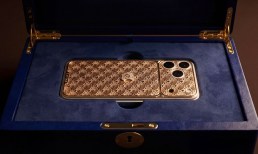Shopping for apparel online is tricky in any case, and shopping for accessories can be particularly taxing because, while one can get a fine feel for the look of a piece, the actual fit is something quite difficult to discern — as looking at an image of an object doesn’t quite tell its scale. Hence, the perfectly tasteful-looking pair of earrings online arrive and are three or four times larger than they appeared on the screen, or the necklace that hung just right on the model … fits an average person like a choker.
This is the problem that California startup FaceCake was founded to solve — leveraging augmented reality (AR) technology and a new cohort of early adopting, mobile-enthused shoppers. The name does not, in this case, give it away. Most might assume the brand was some kind of social media experience for bakers, or perhaps an eCommerce venture built around vanity confections. However, FaceCake isn’t looking to sell baked goods, but it does sell accessories — earrings, specifically, using a virtual reality (VR) tool called Dangle that lets consumers snap a selfie and use it to try on the jewelry.
Anyone familiar with a Snapchat or Instagram filters understands at least the basics of the service. Dangle lets customers try on virtual pairs of earrings by combining selfies and camera effects. Consumers can see how the earrings look at a variety of angles, vary the color and even post images of themselves “wearing” their virtual earrings on social media to solicit public opinion.
The Dangle application is new (rolled out earlier this year), but FaceCake and its concept of operating a retail AR platform is almost a decade old, and has been building out quietly and in the background for some time, according to its Founder and CEO Linda Smith.
“We recognized early on that the future of shopping lay at the intersection of augmented reality and highly relevant personalization. FaceCake’s shopping platform intuitively delivers on that vision,” she said.
Designed to run across product categories and delivery methods (mobile, in-store, desktop, etc.), the goal, according to Smith, is to offer a new shopping experience for consumers that is enabled and improved by technology, and doesn’t feel forced on consumers.
Advertisement: Scroll to Continue
Smith explained, “It can’t be tech for tech’s sake. It actually has to extend or enhance the way you would naturally shop. Consumers might try something cool out once. A tool that makes it easier for them to access great products and feel better about their purchases isn’t something they will think about using. It is something that will just build directly into a shopping flow.”
That ethos extends from the just-introduced Dangle offering throughout FaceCake’s AR-assisted commerce ecosystem. Its beauty commerce app has combined AR try-on tech with visual search. Apart from getting a feel for what makeup looks like on them, users can tap into things like color-match searches that can pull makeup shades from an image and use them to find products to achieve that look.
“GlamScout also offers users a ‘Glam Look’ and a ‘Glam Look for Less,’ the first with prestige brands and the other with mass brands. Users can even pair their favorite NARS blush with a lipstick from CoverGirl to combine the looks. Users are able to feel they have created something that they are interested in very quickly by drilling down their search very quickly,” Smith noted in an interview.
That’s because AR is a powerful tool — one that generates a lot of attention, but it is most powerful in combination with other technological offerings. Dangle makes recommendations for shoppers holistically, she noted, using attributes such as face shape, skin tone, hair color and hair length to customize curated offerings.
“For augmented reality shopping and virtual try-on, realism is key in our intuitive, easy-to-use platform,” Smith said. “With our latest application, Dangle, we solve the biggest shopping challenges for earrings — actual size, and how shape and color fit your personal style.”
At this time, Dangle is directly available for shoppers to download. However, stay tuned. GlamScout is public-facing and relatively popular. It might just have a direct-to-consumer future brewing behind it.




